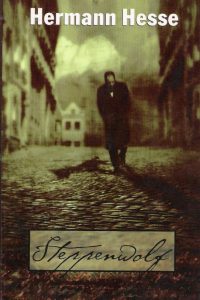
 Literature Guides
Literature Guides
Major Themes of Steppenwolf
Themes
Identity
Harry sees himself as comprised of two exclusive selves. He is the wolf who longs to be alone and free of societal constraints. Yet he is torn by his other half which identifies with tame bourgeois society. While he longs to break free of culture, he is drawn to culture.
His drive for wild solitude is always compromised by his need for human company and companionship. However, the “Treatise on the Steppenwolf” complicates this as it suggests that we are actually made up of multiple selves, and none of these selves are ever truly distinct.
Hesse draws on Eastern mystical traditions and on Jungian archetypes to explore this theory that individual identity is made up of many different “types” or mythological archetypes. The Magic Theater reveals to Harry this possibility and explains to him that he must learn to live with all of these identities and find a point of compromise in order to find peace within himself.
The Eternal
In one of her most revealing moments, Hermine talks to Harry about her belief in something she just calls “Eternity.” She explains that eternity is “At the back of time,” it is the place where works of genius like Mozart come from. This is where true feeling and passion reside. Eternity is that place of the Saints and Martyrs.
This is an expression of Hesse’s own belief in this notion of the eternal. The theme emerges at various points in the novel. Goethe, for example, remarks that people spend too much of their energy concerned with time. At other points in the book, eternity makes its way into small moments as when Harry is dancing at the ball and loses all sense of time.
Suicide and the Destruction of the Self
With the idea that people are always the product of multiple selves, any process which tries to force people into being just one specific version of themselves is destructive. The very idea of a structured and singular sense fragments the individual and causes despair. When Harry is forced to be just one part of himself, he always finds himself contemplating suicide.
When he loses himself, as at the ball, he allows all of his inner selves to be free and becomes content. According to Hesse, the despair of our times comes in part from this notion that we must be one specific type. In doing this, we deny all that we are, and we fall into despair.



